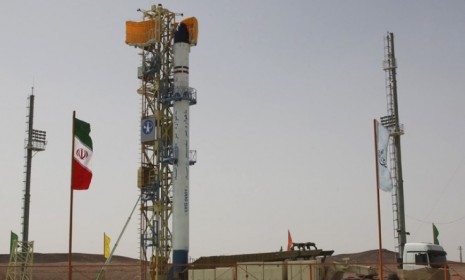Iran's escalating space program: How worried should we be?
Tehran claims another successful satellite launch, raising fresh concerns over Iran's nuclear-missile ambitions — and capabilities

A free daily email with the biggest news stories of the day – and the best features from TheWeek.com
You are now subscribed
Your newsletter sign-up was successful
Iran says it launched a satellite into orbit this week, renewing worries that it could soon be capable of firing long-range nuclear missiles. The Rasad-1 reconnaissance satellite, the second one Iran has sent into space, weighs only 100 pounds, which means the rocket that carried it still lacks the power and sophistication an intercontinental ballistic missile requires. Still, security experts are concerned; the apparently successful mission marks a significant step forward for Iran's space program, which next hopes to put a live monkey into orbit. How worried should we be?
The danger from Iran is rising: Tehran's scientists are just a few steps away from enriching uranium to the point where it's suitable for a nuclear bomb, says Caroline B. Glick in The Jerusalem Post. And this launch indicates that Iran is also making huge strides toward developing intercontinental ballistic missiles. Iran is a distant enemy for Europe and the U.S. now, but once it has both nukes and the missiles to deliver them, Tehran will "constitute a clear and present danger."
The Week
Escape your echo chamber. Get the facts behind the news, plus analysis from multiple perspectives.

Sign up for The Week's Free Newsletters
From our morning news briefing to a weekly Good News Newsletter, get the best of The Week delivered directly to your inbox.
From our morning news briefing to a weekly Good News Newsletter, get the best of The Week delivered directly to your inbox.
At least Iran is behind schedule: Yes, Iran is advancing, says Charles P. Vick, an expert on Iranian rockets at GlobalSecurity.org, as quoted by The New York Times. But Tehran had been aiming to complete this mission last summer. It took them far longer to reach this milestone than they hoped, which suggests that sanctions have been successful, creating major problems for Iran as it tries to secure "foreign technology and hardware."
"After delay, Iranians launch a satellite"
Don't believe Iran's hype: Before you start building a bomb shelter, says Adam Rawnsley at Wired, take "Iran's boasts with a grain of salt." In the past, the mullahs have used Photoshop and outright lies to exaggerate the sophistication of their weapons and rockets. So the satellite launch — if it even reached orbit — and the plan to shoot a primate into space doesn't mean Iran will be nuking anyone soon. For now, the only one with real cause for alarm is the monkey.
"Iran claims launch of second homebrew satellite"
A free daily email with the biggest news stories of the day – and the best features from TheWeek.com
-
 Political cartoons for February 21
Political cartoons for February 21Cartoons Saturday’s political cartoons include consequences, secrets, and more
-
 Crisis in Cuba: a ‘golden opportunity’ for Washington?
Crisis in Cuba: a ‘golden opportunity’ for Washington?Talking Point The Trump administration is applying the pressure, and with Latin America swinging to the right, Havana is becoming more ‘politically isolated’
-
 5 thoroughly redacted cartoons about Pam Bondi protecting predators
5 thoroughly redacted cartoons about Pam Bondi protecting predatorsCartoons Artists take on the real victim, types of protection, and more